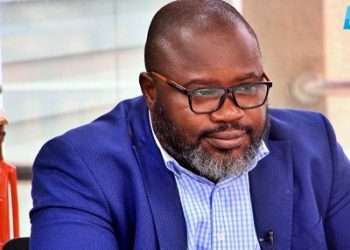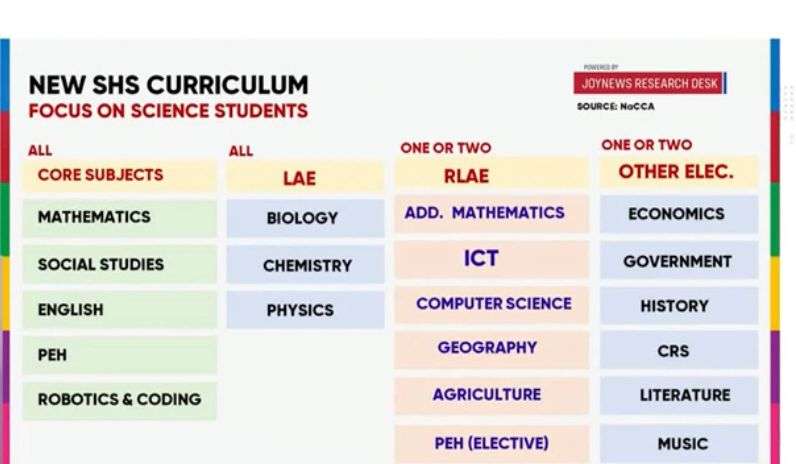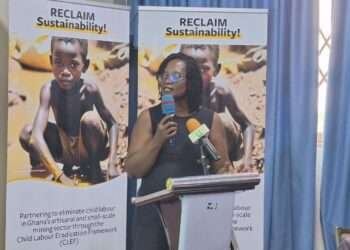The Ghana Education Service (GES), in collaboration with the Ministry of Education and the National Council for Curriculum and Assessment (NaCCA), has introduced a new curriculum for second-cycle schools starting this academic year.
The new framework is designed to shift the focus from rote learning to critical thinking, creativity, and adaptability, with the ultimate goal of aligning Ghana’s educational system with global standards for human capital development.
However, the rollout has sparked controversy, with concerns about a lack of consultation with the Parliamentary Education Committee.
The Executive Director of Africa Education Watch Mr. Kofi Asare has clarified the curriculum’s structure and potential impact.
Addressing Global Trends in Human Capital Development
“The curriculum is well intended. It is in response to global trends in human capital development and the need to produce youth ready for the world of work with 21st-century skills.”
Mr. Kofi Asare Executive Director of Africa Education Watch
He highlighted that, with Africa expected to host the majority of the world’s youthful population in the coming years, the continent will be relied upon to produce a skilled workforce capable of driving socioeconomic transformation.
Ghana’s success in this area, Mr. Asare asserted, will depend heavily on the quality of education and training provided to students, especially at the secondary school level.
Core Structure and Flexibility of Subject Choices
A unique aspect of the curriculum is its flexibility, enabling students to explore various academic disciplines and gain exposure to subjects beyond their core area.
This approach, Mr. Asare explained, acknowledges that many students enter secondary school without a clear understanding of their academic or career interests.
“The curriculum provides flexibility so that as and when decisions are taken, students have an option of subject permutations that enable them to horizontally move from one discipline to another.”
Mr. Kofi Asare Executive Director of Africa Education Watch
For instance, students enrolled in the General Arts program, who may develop an interest in fields like computer science, are now able to select computer science as a subject, even though it traditionally falls outside the General Arts framework.
This flexibility allows students to pursue a broader range of subjects based on evolving interests, ultimately equipping them with a diverse skill set.
Addressing Learning Gaps through Diagnostic Testing
One notable feature of the new curriculum is its inclusion of remedial support for students with foundational learning gaps in core subjects like mathematics and English.
“The curriculum appreciates that learners enter secondary school with various levels of learning attainment. It would be necessary to provide remedial interventions in core subjects.”
Mr. Kofi Asare Executive Director of Africa Education Watch
To address this, a diagnostic test will be administered to new students upon entry to assess whether they require additional support in these subjects. This approach enables targeted interventions, ensuring that students struggling with core competencies receive the help they need early in their academic journey.
Subject Groupings and Permutations
The curriculum is organized into four main areas: Core Subjects, Learning Area Electives, Related Learning Area Electives, and Additional Electives.
This structure allows students to study required subjects within their primary field while also exploring related disciplines.
For science students, core subjects include Mathematics, Social Studies, English, Physical Education and Health, and Robotics and Coding.
Additionally, they can select from learning area electives such as Biology, Chemistry, and Physics, along with related electives like Computer Science, ICT, and Geography.
Mr. Asare clarified that not every school offers every program, which can sometimes lead to confusion. He emphasized that schools have “the competency to deliver teaching in the areas students are allowed to select,” and that guidance is provided throughout the process to help students understand their options.
New Emphasis on Robotics, Coding, and Physical Education

A significant addition to the curriculum is the inclusion of Robotics and Coding as core subjects for science students, with Physical Education and Health also mandatory for all students in their second year.
These subjects, Mr. Asare noted, are not examinable, but they are required, reflecting a shift toward more practical, skills-based learning.
“This curriculum is not just about subject selection, but about equipping students with a well-rounded education that includes both academic and practical skills.”
Mr. Kofi Asare Executive Director of Africa Education Watch
A Flexible Pathway to Higher Education
A major benefit of the new curriculum is the flexibility it provides for students as they transition from secondary school to higher education.
In previous systems, students often felt limited in their subject choices, which constrained their options for university studies.
The new curriculum, however, is designed to accommodate changing interests, as Mr. Asare illustrated with an example:
“You may start secondary school in General Arts, but later develop an interest in Engineering. This curriculum allows you to choose subjects that keep that pathway open.”
Mr. Kofi Asare Executive Director of Africa Education Watch
This adaptability aims to create a dynamic learning environment where students are not locked into rigid subject combinations, thus promoting a more holistic approach to education that prepares them for a range of careers.
Addressing Concerns and Looking Ahead
Despite the curriculum’s forward-looking goals, concerns have been raised about its rollout. Some members of Parliament, particularly from the Education Committee, have expressed dissatisfaction, citing a lack of consultation before the implementation.
Mr. Asare acknowledged these concerns but maintained that the curriculum’s benefits would become more evident over time.
He highlighted the curriculum’s focus on building national values, resilience, and adaptability in students, all of which are essential qualities for succeeding in a rapidly changing world.
The new curriculum for Ghana’s secondary schools represents a bold step toward a more versatile, skills-focused education system.
By emphasizing critical thinking, problem-solving, and practical skills like coding, the curriculum aims to equip students with the competencies needed for both local and global job markets.
“The success of Ghana and Africa as a hub of human capital depends on the quality of young people, we turn out from our training institutions, especially at the secondary level.”
Mr. Kofi Asare Executive Director of Africa Education Watch
While it has faced some opposition, particularly from parliamentary members who feel left out of the consultation process, education experts like Mr. Kofi Asare believe the changes are necessary to foster a capable, adaptable, and future-ready generation.
READ ALSO; KOK Quizzes Linc Edochie on Yul Edochie’s Second Wife





















